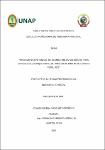Rendimiento potencial de combustibles sólidos de tres especies del bosque varillal húmedo de Nina Rumi, Loreto-Perú, 2021
Abstract
In the present study the potential yield of solid fuels , roasted wood and charcoal of Inga sp ' shimbillo , Alchornea triplinervia " zancudo caspi " and Croton palanostigma " shamboquiro ' of the humid vagal forest in the Nina rumi area was determined . To obtain the samples an inventory of the humid rod forests was carried out and the species were selected by the abundance of the population per hectare and with allometric formulas the tree biomass was determined, the laboratory data was used to calculate the yields per hectare The results show the largest tree population is found in the " shimbillo " species , followed by " zancudo caspi " and " shamboquiro " with 32 trees / ha , 24 trees / ha and 15 trees / ha , respectively . The highest potential yield in toasted wood was in " shimbillo " with 56.37 kg / tree and 1,803.97 kg / ha , followed by " zancudo caspi " with 25.77 kg / tree and 618.41 kg / ha ; the " shamboquiro " it is the one with the lowest potential yield with 13.44 kg/tree and 618.41 kg/ha. The highest potential carbon yield has also been determined in "shimbillo" with 26.53 kg/tree and 848.94 kg/ha; followed by ' Zancudo caspi ' with 12.13 kg / tree and 291.02 kg / ha ; and in lower yield in " shamboquiro " with 6.32 kg / tree and 94.85 kg / ha The Kruskal - Wallis statistical test and Dunn 's comparison indicate that there is significance in the comparison of yield in toasted wood and " shimbillo " charcoal with " Zancudo caspi " and " Shamboquiro” En el presente estudio se determinó el rendimiento potencial de combustibles sólidos, madera tostada y carbón de Inga sp “shimbillo”, Alchornea triplinervia “zancudo caspi” y Croton palanostigma “shamboquiro” del bosque varillal húmedo en la zona de Nina rumi. Para obtener las muestras se realizó un inventario de los bosques de varillal húmedo y se seleccionó a las especies por la abundancia de la población por hectárea y con fórmulas alometricas se determinó la biomasa arbórea, se ha utilizado los datos del laboratorio para calcular los rendimientos por hectárea. Los resultados muestran la mayor población arbórea se encuentra la especie de “shimbillo” seguido de “zancudo caspi” y de “shamboquiro” con 32 árboles/ha, 24 árboles/ha y 15 árboles/ha respectivamente. El mayor rendimiento potencial en madera tostada fue en “shimbillo” con 56,37 kg/árbol y con 1803,97 kg/ha; seguido de “zancudo caspi” con 25,77 kg/árbol y 618,41 kg/ha; el “shamboquiro” es la que presenta el menor rendimiento potencial con 13,44 kg/árbol y 618,41 kg/ha. El mayor rendimiento potencial en carbón también, se ha determinado en “shimbillo” con 26,53 kg/árbol y 848,94 kg/ha; seguido de “Zancudo caspi” con 12,13 kg/árbol y 291,02 kg/ha; y en menor rendimiento en “shamboquiro” con 6,32 kg/árbol y 94,85 kg/ha. La prueba de estadística de Kruskal-Wallis y la comparación de Dunn, indica que existe significancia en la comparación del rendimiento en la madera tostada y carbón de “shimbillo” con “Zancudo caspi” y “Shamboquiro”.
Collections
- Tesis [527]


